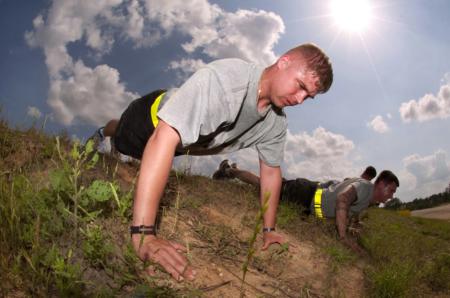Muscular Christianity
Why are you reading this column when you could be reading George Weigel? Frankly he is able to say what we want to say in a much more powerful way. When we open these pages we gasp at his candor and daring. Remember his April 24th article: "'Wolf Hall,' and Upmarket anti-Catholicism"? Weigel wasn't taking it lying down when the PBS network and even Broadway took up British novelist, Hilary Mantel's version of fictional history, making Thomas Cromwell her hero, and thus many women's book group readers' idol. This was a complete rewriting of early Tudor England and the life and work of our St. Thomas More. George Weigel wasn't taking it lying down, and called them out. "The Mantel book," the PBS series and Broadway were clear anti-Catholicism. Thank goodness for muscular Christians like George Weigel.
A "muscular Christian" was something akin to being a current-day Doctor of the Church, or a stout defender. Martyrs are made of stuff like this. The maligned Thomas More leaps to mind. They are in a drum roll of saints. Their portrait banners are paraded in St. Peter's Square on a regular basis. These saints and martyrs for the faith may have had their doubts, but once on the path they never wavered. Think Dorothy Day.
A little research revealed our error about the meaning of muscular Christianity. The notion of a muscular Christianity was born in the 19th century owing to a novel by Charles Kingsley suggesting the connection between a fit mind and a fit body. (We can't say if George Weigel fits this particular bill.) The very idea of going away to camp, or to camp meetings of the early 20th century was for spiritual conversion while becoming physically strong. The Young Men's Christian Association, known as the YMCA, emerged out of growing sense of the feminization of young men as a way to develop boys' manliness through developing outdoor abilities. Although the mind-body concept has deep roots in ancient Greece, the semi-religious YMCA revived it here.
No doubt there was opportunity for inner city boys to escape smoky cities to breathe healthy outdoor air, but make no mistake, the belief was that a strong spiritual mind requires a strong body. Adherents of these principles included Amos Alonzo Stagg who sought to reconcile his passion for sport and his Christian vocation. As a devout Christian, he could still love the rigors of football. After all it was Jacob who wrestled the angel, giving credence to the benefits of physical labors and competition.
The philosopher, Michael Novak, wrote a book, "The Joy of Sport" in 1976. As an avid football fan today, his memory is full of participation. "Perhaps it is a form of Slavic masochism (we can never discount it)", he writes, "but all my life I have never known such thoroughly penetration joys as playing with an inspired team we recognized from the beginning had every reason to beat us. I love it when the other side is winning and there are only moments left. I love it when it would be reasonable to be reconciled to defeat, but one will not, cannot. I love it when a last set of calculated, reckless, free and impassioned efforts is crowned with success. That is the way I believe the human race should live, when humans actually accomplish it, it is for me as if the intentions of the Creator were suddenly limpid before our eyes, as though in the fiery heart of the Creator we had momentary insight."
Eric Liddell, a Scottish divinity student and one of the heroes of the movie about the 1924 Olympics "Chariots of Fire," voiced his sense of the fusion of body and spirit: "I believe God made me for a purpose, and when I run I feel His pleasure...it's not just fun...to win is to honor Him." Remember, too, that Liddell refused to run in his prime Olympic event because it was being held on a Sunday, the Lord's Day.
C.S. Lewis, surely by our definition a qualifier as a muscular Christian, once wrote of a Christianity which produced a "good infection." Does he mean a spirit which takes hold of us from within? Sometimes an infection requires our own anti-bodies be aroused to protect against lesser beliefs.
At the heart of a muscular Christian is courage formed by a habit that can be strengthened by practice, and by regularly exercising it. Christianity today requires a show of courage, particularly when so many consider any public show of faith as somewhat anti-social, and for some, a "hate crime." In most public gatherings it takes courage to state a Christian view on same-sex marriage, abortion or the afterlife. A priest friend suggests that as "warm-up exercises" we should bless ourselves and say grace in a restaurant, even though it inevitably draws glances, many of them hostile.
Novak Djokovic, the number one tennis player in the world, crosses himself after winning a big match, while still on the court. Ditto Tim Tebow, who kneels on the field of plan. Once that was commonplace -- now irritating for some -- and an interesting curiosity for others.
As engaging in sport leads to better character, we enroll our young in team sports. It's good for mind and spiritual growth. As long as competition isn't the only goal. Winning isn't all. Playing the game has its own merits. We have never cottoned to the idea that "who won" is the important aspect of sport. Just being out there is still occasion for straining to be of strong character. Keeping in mind the linkage between mind and body, let us welcome our campers back home.
KEVIN AND MARILYN RYAN, EDITORS OF "WHY I'M STILL A CATHOLIC," WORSHIP AT ST. LAWRENCE CHURCH IN BROOKLINE.
- Kevin and Marilyn Ryan, editors of "Why I'm Still a Catholic," worship at St. Lawrence Church in Brookline, Mass.



















